Eventually, the New York Rangers will be complete again. The Patrick Kane saga ended this week, with general manager Chris Drury bringing the drawn-out and complex process of acquiring the future Hall of Fame forward from the Chicago Blackhawks to a conclusion. The Blueshirts will soon play with six defensemen and 12 forwards, and despite an acute lack of financial flexibility brought on by the Kane trade, will take the ice as a (somewhat) normal hockey team once more, with the salary cap sure to create depth issues for the rest of the regular season.
Yet even in possession of an impressive roster marked by some of the most skilled offensive players in the world, there is one problem with these Rangers that neither Kane nor fellow blockbuster acquisition Vladimir Tarasenko can solve: This club is not, as they say, necessarily built to have success in the modern NHL playoffs.
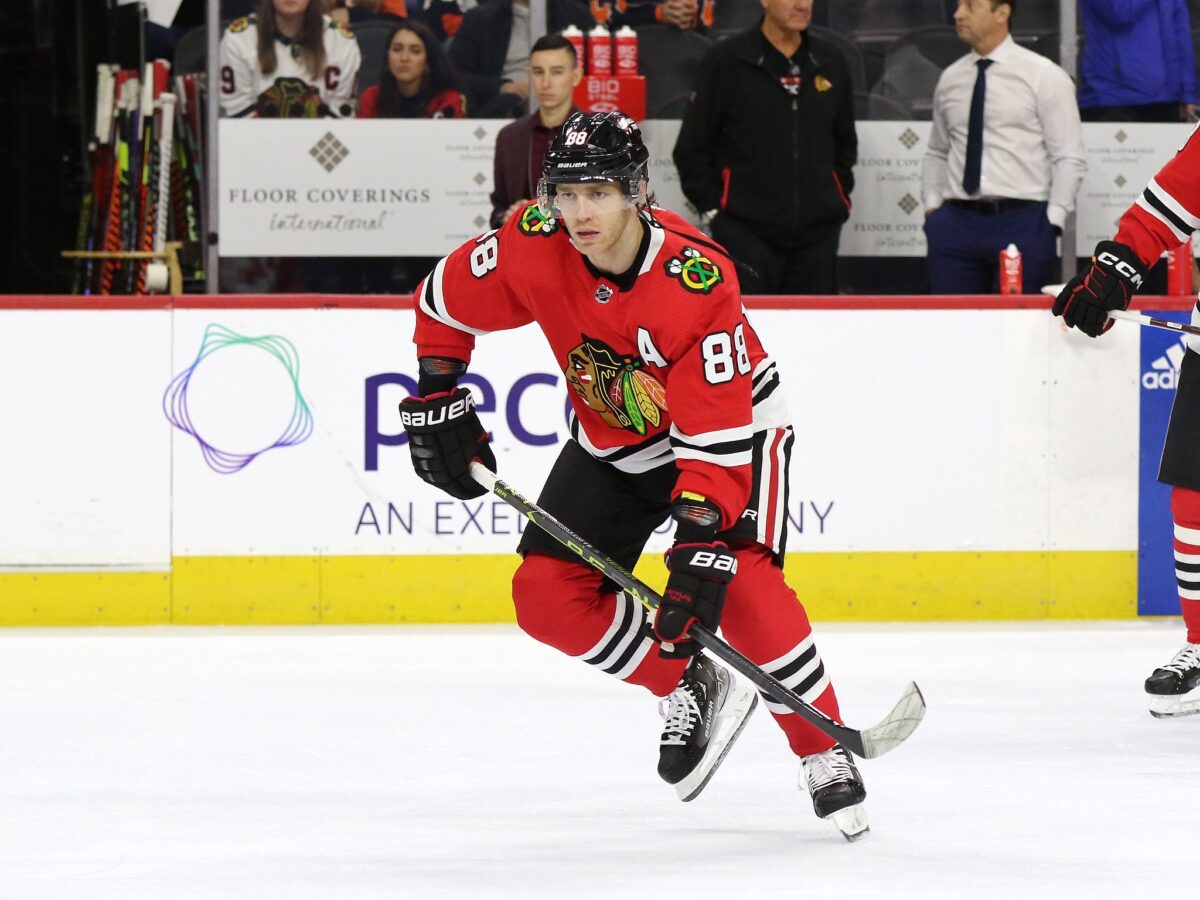
Yes, it’s a very exciting time for Rangers fans, whose high-octane, puck-possession team can push the pace through the neutral zone and break opponents down with their skill in the offensive zone. Their power play, lethal last season before taking some steps back in 2022-23, should eventually regain that form with Kane and Tarasenko added to the top two man-advantage units. With those two joining Chris Kreider, Mika Zibanejad, Artemi Panarin, Vincent Trocheck, Adam Fox and the “Boyz 2 Men Line” of Kaapo Kakko, Filip Chytil and Alexis Lafreniere, the Rangers should be a handful from now until the end of the regular season.
What the Rangers have very little of, though, is the kind of size, grit and grind that, cliche or not, has proven time and again to be vital to going deep in the postseason – a tournament that is won in relentless battles in the corners, below the circles and in front of the net.
Rangers’ Attempt to Toughen Up Roster Lasted Less Than Two Years
A stark reminder of that fact came Feb. 25 in a 6-3 blowout at the hands of the Washington Capitals, who aren’t likely to make the postseason but who play a postseason style that was utterly effective against the Rangers. The Caps took time and space away from the Blueshirts forwards, forcing the match into the dirty areas, throwing the body around and dominating the contest from start to finish.
Perhaps it will give Rangers fans some comfort to know that coach Gerard Gallant, whose playing career left him keenly aware of the need for sandpaper in a lineup, isn’t concerned about the composition of his team.
“We’re not going to get intimidated or pushed around by anybody,” Gallant said shortly after the Kane trade was completed. “We might not play quite the same style as we did last year. We’ve got skill and talent and we play fast… It’s a different makeup, but I don’t see any issue.”
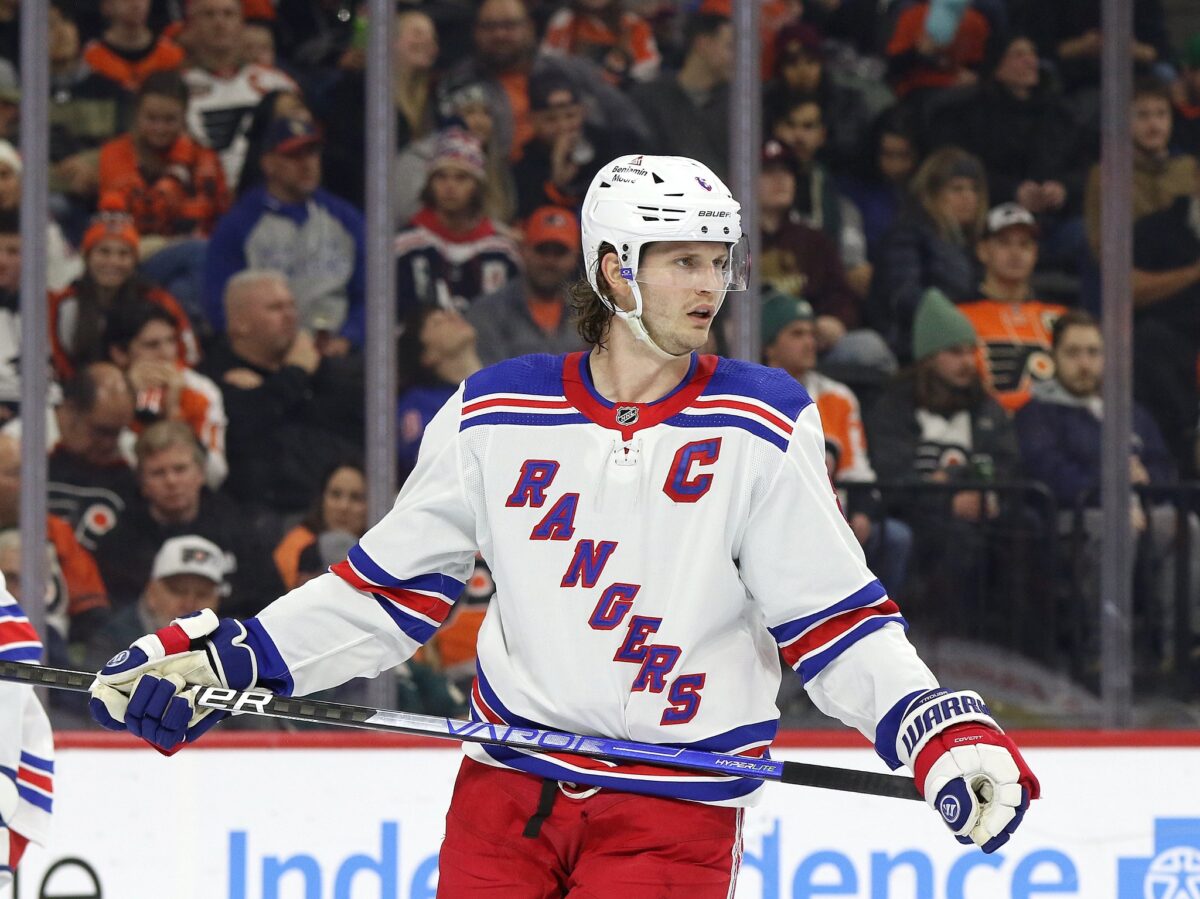
The Rangers stopped their four-game skid with a gutty 5-2 home victory over the Los Angeles Kings on Feb. 26, playing short-handed in order to make the Kane acquisition possible under the salary cap. Yet no one who will be returning to fill out the Blueshirts’ lineup will cause them to resemble the Caps.
It was Washington, ironically, that nearly two years ago sparked upheaval in the Rangers’ front office and created a supposed organizational mandate to make the Blueshirts bigger and tougher – ostensibly to compete with the Capitals of the NHL world. Drury, who replaced fired GM Jeff Gorton and president John Davidson, was elevated to the head of the team’s personnel operations in part to accomplish just that.
Yet since that 2021 offseason, not long after the “Tom Wilson Incident” led to a presumably lasting change in team philosophy that was followed by a flurry of personnel moves that indeed made the Blueshirts a more brawny outfit, organizational DNA has reasserted its preeminence. As they’ve been for so much of their existence, the Rangers are loaded with high-end scorers in their top-nine forward group, with almost no one left on the roster to show for their supposed course correction toward will over skill.
The lone remaining member of the “Class of Summer 2021,” Barclay Goodrow, is a mainstay and will likely center the fourth line going forward. He provided a reminder of what the Rangers are now again largely missing when he drove to the net and deflected in the Blueshirts’ first goal in the Feb. 25 loss.
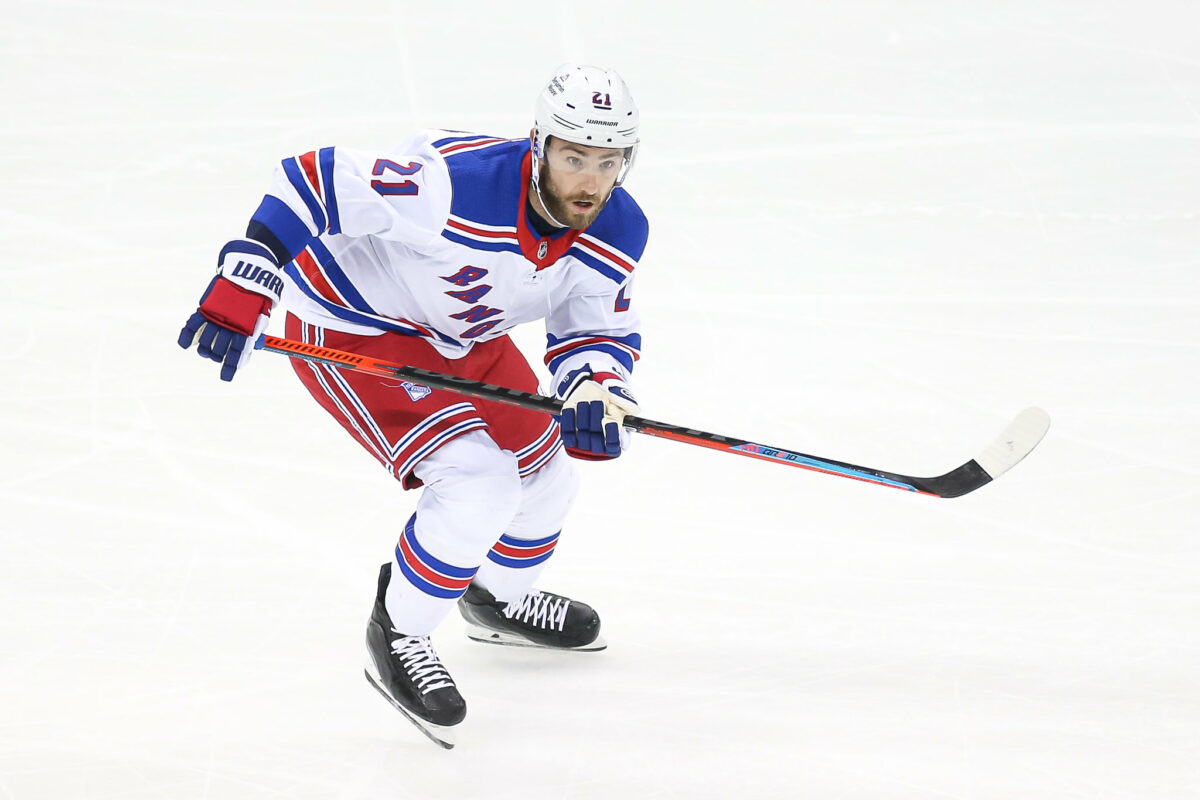
Goodrow’s playoff-tailored game was crucial to the Tampa Bay Lightning’s back-to-back Stanley Cups in 2020 and ’21. He’s brought the same hard-hat, heart-and-soul approach to a pair of strong seasons in a Blueshirt, including the team’s surprise run to the Eastern Conference Final last spring. The question is whether his current team has enough players like him to make the difference in a tough playoff series.
Championship Teams of Kane, Tarasenko Featured Plenty of Grit
It was just such a series against just such a team, Goodrow’s former club, that exposed the limits of the Rangers’ approach in the East Final last year. The Lightning, with their huge defense corps, simply exploited the Blueshirts’ identity as a largely perimeter team by working to keep them there. Forced along the boards and away from the middle of the ice by Victor Hedman, Erik Cernak and co., the Rangers had no one who could get to the net for high-percentage chances over the final four games, all won by Tampa Bay, which allowed only five goals in that stretch.
It’s reasonable to believe that another deep Rangers playoff run would have to go through the west coast of Florida. The Lightning are still big and strong, and they just added power forward Tanner Jeannot in a trade with the Nashville Predators. In a theoretical rematch with Tampa, would the additions of Tarasenko and Kane make the difference up front this time?
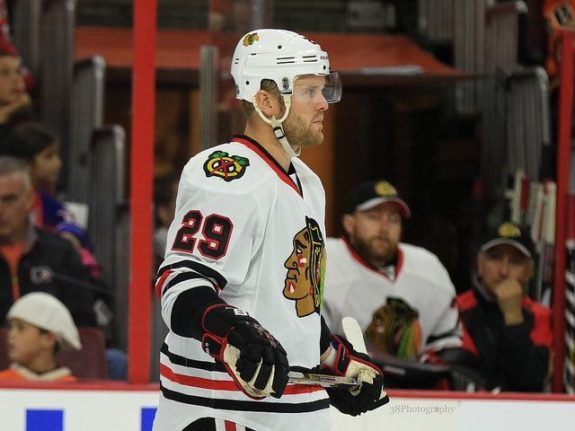
Both star right wings can speak to the importance of the certain kind of player needed to deliver the ugly offense that’s so valuable to a championship run. It’s why 6-foot-4, 223-pound forward Bryan Bickell played a critical role in Kane’s second Stanley Cup, scoring nine goals with eight assists in the 2013 playoffs, giving the Blackhawks a nearly-unmovable presence around the net. There was also Dave Bolland, cut from the same cloth as Goodrow, who scored three times in that Cup Final, including the clinching goal with 59 seconds left in Game 6 against the Boston Bruins (after Bickell had tied it 17 seconds earlier).
Tarasenko does a bring a playoff-ready game, using his 228-pound frame to excel down low in the offensive zone, as he’s scored 41 goals in 90 career playoff games. He was an integral part of the 2018-19 Blues team that was a seven-game champion over the Bruins, St. Louis being a big, strong outfit built to grind its way through the playoffs.
His current team … mostly isn’t.
Related: Cuylle’s Debut Reminds Rangers of What They Need to Become
None of this is to say the Rangers can’t succeed as currently constructed, as Gallant insists. There’s a great deal of playoff experience to go with all the firepower, and there’s no reason the club can’t draw lessons from last season and put on the work boots as a result. The Lightning, after all, learned after years of falling short in the postseason that bringing in grittier players wasn’t enough – even their high-end skill guys needed to play a straight-line, simpler game and get down in the trenches to get through NHL playoff gauntlet.
Yet the Lightning did, and do, have those kinds of jagged players on their roster. In contrast to the Rangers’ defense, which curiously possesses the nasty edge that the forward group largely lacks, the Blueshirts up front are going to have to find their inner snarl and desire to crash the goal mouth and perhaps get a little bloody at some point if they want to take the next step from last year.
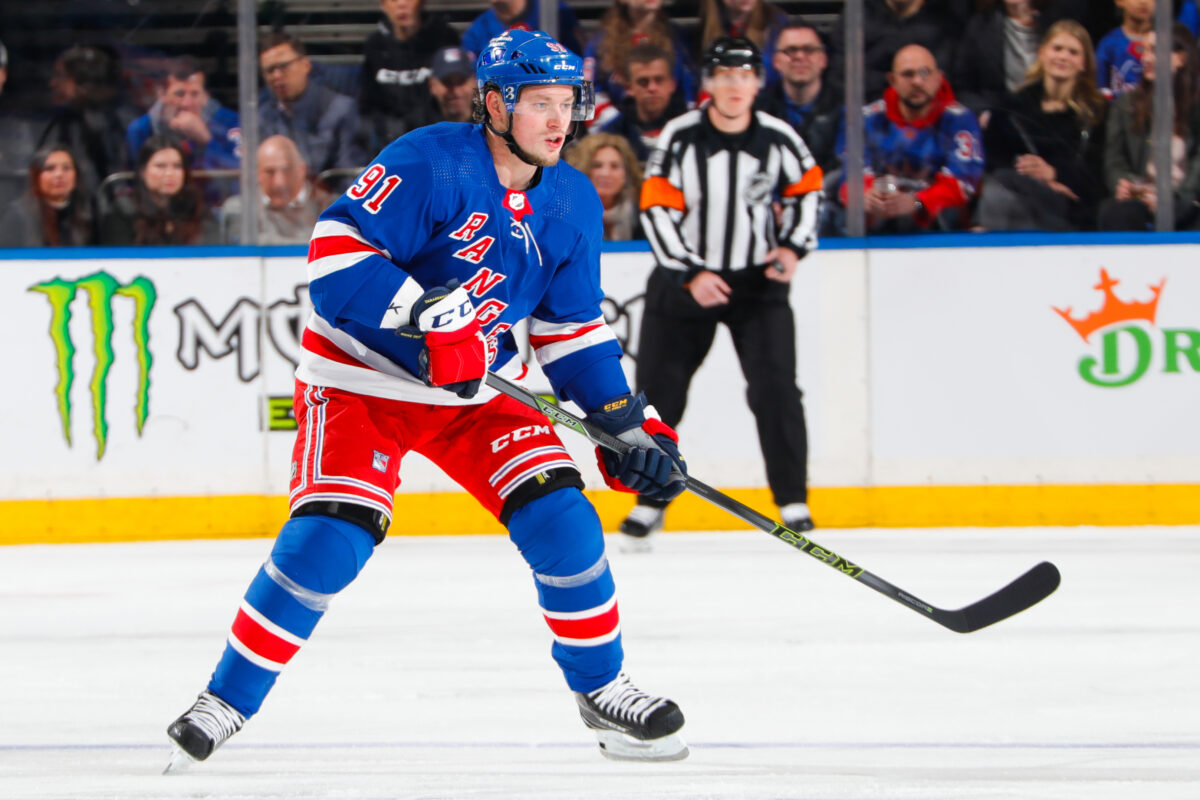
Can they do it? For better or worse, this is the Rangers team that will head into the postseason. We’ll know soon enough.